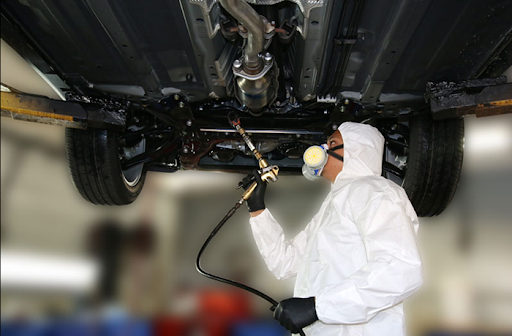Rust Proofing: Everything You Should Know
Posted on April 15, 2021
Is Rustproofing For New Cars Necessary?
A great Canadian icon once said that rust never sleeps. For those amongst us who are not necessarily well versed in the world of dad rock, that icon was Neil Young and any car enthusiast will tell you that he was right, about the rust thing, at least.
Now, as every Neil Young fan also knows, he left behind the harsh Canadian winter for sweet California living. Rust takes its time in warmer climes so Neil has less to worry about in that regard than those who choose to live north of the border.
So, what causes those cost-intensive orange spots to blossom in the first place? Water exposure is the most prevalent cause, such as rain and snow. Humid air could even be the catalyst as it works its way into the small parts of your car. Combined with the oxygen, the moisture creates a chemical reaction called oxidation, which leads to corrosion. Once that damage begins, it accelerates quickly. Even UV rays from the sun can exacerbate it.
Oxidation is no joke where the wind and the snow howl and it can wreak havoc on your ride and your wallet. What a shame to let a perfectly good car be eaten from the outside. Aside from just the normal wear and tear that ice and snow and water can put on your vehicle, the salt and gravel that we use to maintain a solid grip on the road in wintertime can put a real hurt on your car’s exterior.

Why Rustproof Your Car?
Well, for one thing, winter. And it’s more than just the cold and wet that’ll get to your car. Salt ain’t what it used to be. We use complex chemical formulations on our roads now that have magnesium chloride in the mix. Magnesium chloride is a sticky compound and the rationale is that it will stick to the road better than plain salt would. While this may be true, it also means that it sticks to our cars’ surfaces as well.
There’s more to it than just the water, cold, and salt too though. We Canadians are a hearty bunch and we like to traverse the unbeaten path as much as we can. A portion of the damage that our car incurs is due to unkempt country roads that we experience on our way to cottage country or just on a weekend road trip outside of the urban areas. Pebbles and stones from these surfaces can fly up and chip the surface of the underside of the car. When this sort of surface damage occurs, the exposed areas become less protected against corrosion.
Here at CarHub, we value and respect cars so much that we love to see as much care as possible put into the maintenance of a vehicle. So we would always advise rust proofing. The truth of the matter is though, that if you like to flip your vehicle every few years, it may not be all that prudent to consider rust proofing. If you’re looking for longevity in a vehicle though, rustproofing is the ticket.
As with most things automotive, the question often comes down to whether or not you want to fork over the dough upfront or down the line. Even if you don’t plan on keeping your vehicle for years, rust proofing can prevent repairs such as fuel line corrosion, which is far more costly than rust proofing would have been in the first place. It would set you back thousands as opposed to hundreds - is that a gamble worth taking??

Should I Wash My Car Before Rustproofing?
It’s always advisable to wash your vehicle’s undercarriage before bringing it for rustproofing. It’s best to avoid thick or waxy cleaning products when you do this as well because these can promote air pockets on the surface of the undercarriage and these are volatile rust zones.
A pressure wash will ensure that you wash away the detritus like dust or mud. Rustproofing on top of either will lead to an ineffective process and the paint will start to peel in short order which is a waste of your time, energy and money.

When Is the Best Time to Rustproof Your Car?
You’re in luck if you happen to be reading this article right now! It’s springtime in Canada it’s generally agreed that spring or summer is the best time to rustproof your vehicle. This is because springtime is generally drier with less abrasive elements on our roads that would undermine the efficacy of the rustproofing process, so it's time to get your car ready for spring.
Interested in giving your car the best protection that it can get against corrosion? You can book an appointment today to speak to a CarHub service professional about how we can rustproof your vehicle and get it in shape for the upcoming winter season!
